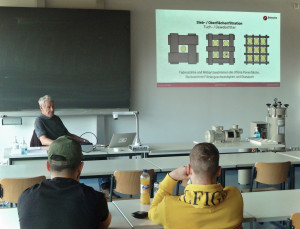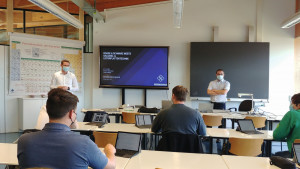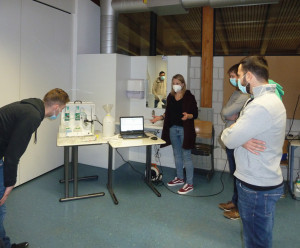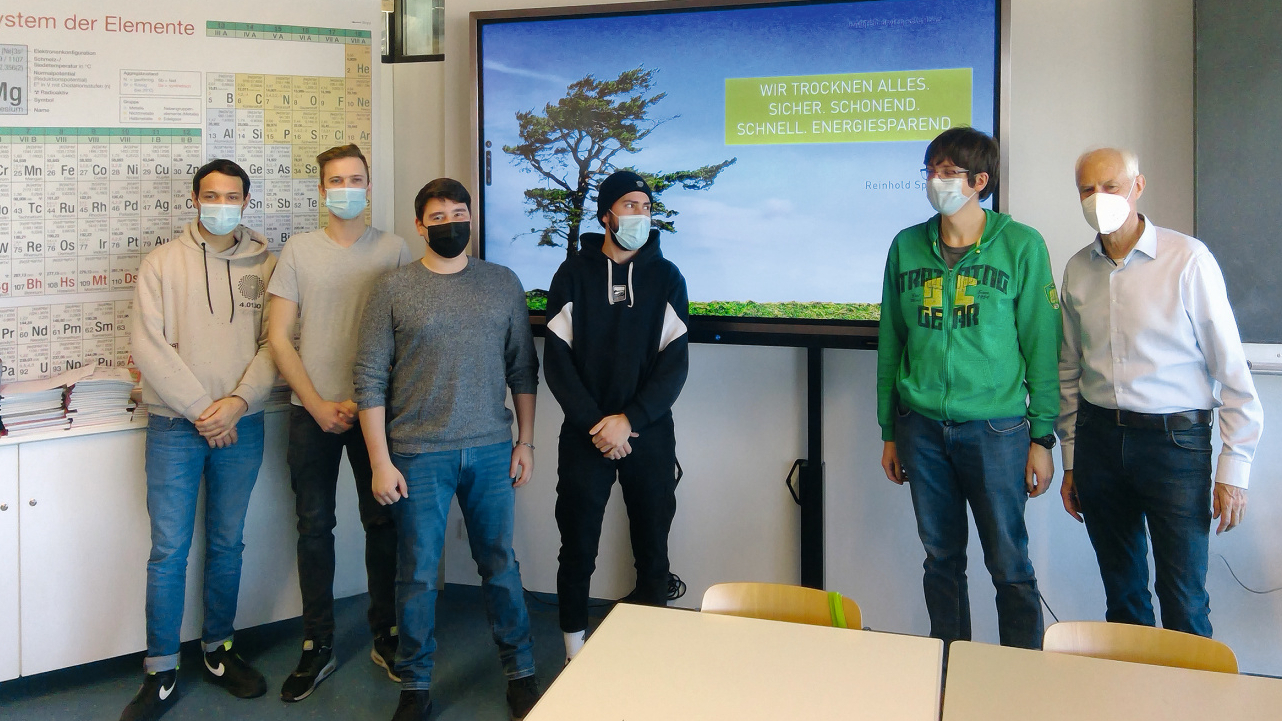The technical college for electroplating technology in Schwäbisch Gmünd trains young people for electroplating and surface technology. Instruction covers all relevant skills of the profession. The trainees also receive regular training in their specialist areas from experts in the field.
Filtering electrolytes
 Jan Bohncke from Bohncke GmbH in Hünstetten-Wallbach shares his decades of experience with the students at the technical college for electroplating technologyAtthe end of last year, Jan Bohncke from Bohncke GmbH in Hünstetten-Wallbach gave a lesson on filter technology. Bohncke has decades of experience and spoke about filtering galvanic electrolytes.
Jan Bohncke from Bohncke GmbH in Hünstetten-Wallbach shares his decades of experience with the students at the technical college for electroplating technologyAtthe end of last year, Jan Bohncke from Bohncke GmbH in Hünstetten-Wallbach gave a lesson on filter technology. Bohncke has decades of experience and spoke about filtering galvanic electrolytes.
Dirt particles in electroplating baths lead to defective coatings, i.e. rejects. The electrolytes must therefore be continuously filtered. The students learned from the founder of Bohncke GmbH what can be done wrong and how to do it right and save money in the process. Different filter processes and media were discussed, as well as the associated pump technology and piping issues. A simple example calculation of different filter cartridges showed that filter methods that initially appear cheaper can be more cost-intensive and worse in the long run. In addition, a filter technology is only good if it is also user-friendly: then it will be used consistently, emphasized Bohncke.
The example of CD production showed what purity can mean in electroplating technology. The CD embossing tools are electroformed. The data tracks on the CD have a distance of 1.6 μm (1.6 millionths of a meter) between them. For comparison: respirable fine dust particles can have a diameter of up to 2.5 μm. These are the challenges that modern filter technology for galvanic electrolytes faces today.
Printed circuit board technology
 Florian Bielmeier and Franz Stöger from Rohde & Schwarz GmbH in Teisnach also focused onPCB technology in Schwäbisch Gmünd in 2021. Speakers Florian Bielmeier and Franz Stöger from the Teisnach plant of Rohde & Schwarz GmbH & Co. KG in the Bavarian Forest introduced the students to high-tech in PCB technology. They revealed that the development lead determines whether a product can be manufactured profitably at the cost-intensive location of Germany. They cited smartphones as an example: "In the smallest of spaces, we find a power density that no PC would have achieved just a few years ago. We are therefore dealing with high technology. The basis of these extremely miniaturized electronic circuits is the printed circuit board, the production of which requires, among other things, a whole series of electroplating process steps. Today, a smartphone is affordable for practically everyone. The reason: production takes place in Asia, where production can be very cost-effective. But the testing technology for smartphones comes from Rohde & Schwarz, including the high-tech PCBs required for this.
Florian Bielmeier and Franz Stöger from Rohde & Schwarz GmbH in Teisnach also focused onPCB technology in Schwäbisch Gmünd in 2021. Speakers Florian Bielmeier and Franz Stöger from the Teisnach plant of Rohde & Schwarz GmbH & Co. KG in the Bavarian Forest introduced the students to high-tech in PCB technology. They revealed that the development lead determines whether a product can be manufactured profitably at the cost-intensive location of Germany. They cited smartphones as an example: "In the smallest of spaces, we find a power density that no PC would have achieved just a few years ago. We are therefore dealing with high technology. The basis of these extremely miniaturized electronic circuits is the printed circuit board, the production of which requires, among other things, a whole series of electroplating process steps. Today, a smartphone is affordable for practically everyone. The reason: production takes place in Asia, where production can be very cost-effective. But the testing technology for smartphones comes from Rohde & Schwarz, including the high-tech PCBs required for this.
The current state of the art of printed circuit boards and how they are manufactured was part of the presentation given by the speakers, who are now in leading positions, but acquired the tools for their current work at the technical college for electroplating technology. Other key qualifications were also presented to the students. These include communication and planning skills in cooperation with other technical disciplines as well as management skills in order to secure the technological lead. The Schwäbisch Gmünd Technical College for Electroplating is the only one in Europe to provide a broad education in the theory and practice of PCB production.
The order goes to those who know their processes
 Tanja Bosch from Deutsche Metrohm Prozessanalytik GmbH & Co. KG, Filderstadt, spoke inJanuary about process analyt ics Tanja Bosch from Deutsche Metrohm Prozessanalytik GmbH & Co. KG, Filderstadt, spoke in Schwäbisch Gmünd in January about process analytics, which is particularly important in large customer industries such as the automotive industry. The companies active in this sector have to face the challenges posed by quality requirements, cost pressure and quality assurance. For electroplating, this means If you want to produce consistently high quality, you need to be able to continuously know and control the concentrations of your process baths. If production is to be cost-effective at the same time, potential savings must be made in terms of production times, raw material and waste quantities and personnel deployment. Seamless documentation of quality assurance is a matter of course. This is where process analysis comes into play: In contrast to the classic method of sampling on site and analysis in the laboratory, the analyses are automated, prompt and continuous directly in the process baths. This generates much more information that can be used directly for process control and documentation. At the same time, this meets the requirements of digitalization, keyword "Industry 4.0". A variety of automated analysis methods are available to determine the bath concentrations, from titration, potentiometry and photometry to various spectroscopic measurement methods. The students were able to try out various analyzers for themselves and see for themselves the uncomplicated construction of individual components, which were disassembled and reassembled.
Tanja Bosch from Deutsche Metrohm Prozessanalytik GmbH & Co. KG, Filderstadt, spoke inJanuary about process analyt ics Tanja Bosch from Deutsche Metrohm Prozessanalytik GmbH & Co. KG, Filderstadt, spoke in Schwäbisch Gmünd in January about process analytics, which is particularly important in large customer industries such as the automotive industry. The companies active in this sector have to face the challenges posed by quality requirements, cost pressure and quality assurance. For electroplating, this means If you want to produce consistently high quality, you need to be able to continuously know and control the concentrations of your process baths. If production is to be cost-effective at the same time, potential savings must be made in terms of production times, raw material and waste quantities and personnel deployment. Seamless documentation of quality assurance is a matter of course. This is where process analysis comes into play: In contrast to the classic method of sampling on site and analysis in the laboratory, the analyses are automated, prompt and continuous directly in the process baths. This generates much more information that can be used directly for process control and documentation. At the same time, this meets the requirements of digitalization, keyword "Industry 4.0". A variety of automated analysis methods are available to determine the bath concentrations, from titration, potentiometry and photometry to various spectroscopic measurement methods. The students were able to try out various analyzers for themselves and see for themselves the uncomplicated construction of individual components, which were disassembled and reassembled.
Dry, stain-free and ecological
The topic of drying was on the agenda in February. The speaker was Reinhold Specht from Harter GmbH, Stiefenhofen. Corrosion protection coatings need to be dried gently and dials need to shine without stains. In addition, dewatered metal sludge consumes less energy during transportation than wet metal sludge: these are all drying tasks that need to be solved in electroplating and surface technology. The drying technology from Harter GmbH not only uses condensation for dehumidification, but also recovers the energy required for drying. This principle is also used in a similar way for the well-known heat pump tumble dryers. Interesting for electroplating: Up to 75% of electrical energy can be saved here. This means that this drying process is not only ecological, but also profitable.
Training is currently underway in Schwäbisch Gmünd. For next year's training, registration at the technical college for electroplating technology is still possible until March 2023. Relevant vocational training is required. Click on the application form at the Schwäbisch Gmünd vocational school to register for the two-year full-time training course to become a state-certified technician specializing in electroplating technology. Block and full-time students can be accommodated in the youth hostel for the duration of their training.


